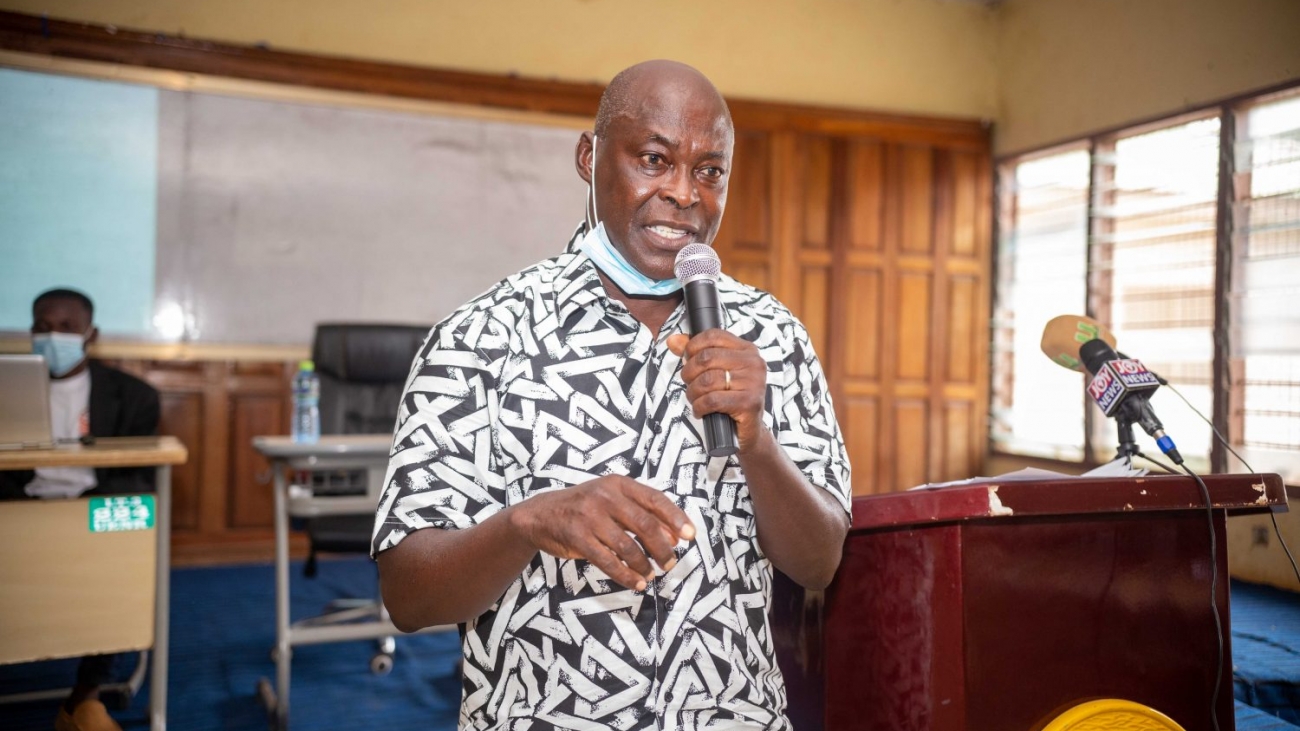A renowned scholar at the Northeastern University in the United States, Prof. Kwamina Panford has debunked the notion that developed countries are performing miracles in engineering and technology termed as the “Chinese miracle”. According to the Professor, there is nothing phenomenal about the western world regarding development rather, it is a matter of smart planning, commitment and hard work which Ghanaians can emulate such principles towards development instead of relenting to just hope and prayers.
Prof. Panford was speaking at a public lecture held on the 5th August 2021 at the University of Energy and Natural Resources (UENR), Sunyani on the topic: “Triple Threats on Ghana’s Economic Horizon: Public Policy Implications & Roles of UENR.” The lecture which was well attended by staff and students of the University was to aggravate ideas from research towards Ghana’s development.
Speaking further on the topic, Prof. Panford explained that the objective of the lecture is to provoke thoughts in the development of natural resources and Ghana’s socio-economic growth where UENR could play a key role in realizing its vision as a university. According to him, Ghana has does not only have a bad story in terms of engineering, technology and natural resources but there is also some good news on Ghana’s natural resources as well. However, he opined that strategic planning ought to be in place to enable the country to achieve massive technological developments. The Speaker added that the country’s challenge in natural resources is not the passage of laws but its implementation. He cited examples of legislation passed in the pre-2012 positive developments Ghana’s oil such as PRMA 2011 and PIAC PC Act 2011, Local Content 2013, Exploration and Production Bill approved in 2016, PIAC, PET Funds, Heritage and Stabilization Funds, among others.

Additionally, Prof. Panford indicated three key threats to Ghana’s economy. According to him, Small Scale Mining called “Galamsey” is a self-inflicted mortal economic and environmental wound under World Bank, Neo-Liberal Economic Framework and 1986 Mineral Laws under the PNDC. He lamented that these laws have generated the influx of current mining issues such as the destruction of forest reserves and massive environmental pollution in the country except in the Volta region. He added that with the many mining activities ongoing in the country guided by law, Ghana has less gold to show despite efforts to surpass or runs neck to neck with the Republic of South Africa (RSA) as Africa’s No1 Gold Producer. He was of the view that the country is still at crossroads on allowing the operation of community mining (Small Scale) since that is the main source of livelihood for the mining communities. He cautioned the government to ensure concrete measures in involving the security forces in the fight against galamsey.
Prof. Panford further mentioned that the influx of the Chinese cocoa production in the greenhouse and the use of mechanized extraction versus Ghana’s dependency on climate, sun and manually dried cocoa beans transported on bad muddy roads as a key threat to Ghana’s cocoa production. He said the Chinese getting into cocoa production at a time where there are rumours of Ghana’s cocoa soil being contaminated could be one of the worst nightmares for Ghana.
The speaker indicated that most analysts forecast that by 2045, hydrocarbons (Petroleum) will no longer be the dominant energy source for heating and fuel for cars, even though LPG can be compressed and used to fuel vehicles up to 80% cleaner than diesel or petrol, it will be no longer used as fuel in America and Western Europe. He indicated that prominent environmentalists have representatives included in Boards meetings of two world largest US oil companies: Chevron and Exxon Mobile. These Environmentalists, the speaker says seek to push oil companies toward zero carbon emissions to cut global warming. He quizzed; how is Ghana equipping the economy to meet up these expected developments in the not-too-distant future. Citing UENR as an academic and research institution, Prof. Panford said the University could use the natural resources policies to resolve threats faced by the country.
Looking at the way forward, Prof. Panford admitted that though there have been efforts to restructure the educational system since the post-colonial era, additional strategies should include creating jobs to assimilate the expertise produced by academic institutions to pave way for more students to be trained and support Ghana’s development. He recommended that in order to resolve the country’s natural resources menace; much attention should be given to the unemployed Ghanaian youth populace who are resorting to scrapping and other illicit activities to survive.

Prof. Panford teaches Africa/Global Studies, Development/Natural Resources and Public Policy at Northeastern University, Boston. He just won his third Carnegie Africa Diaspora Fellowship (CADFP) for 2020-2021. He is also affiliated with the graduate program in Law and Public Policy, School of Public Policy & Urban Affairs and the Center for International Affairs at Northeastern where he has been the Chair of the Department (2002-2005) and a Vice Provost for Academic Opportunity & Access (2003-2008).
The lecture was chaired by the Vice-Chancellor, Prof. Elvis Asare-Bediako and moderated by the Registrar, Mr. Solomon Panford, Esq. Other management members of the University present were the Dean of School of Management Sciences and Law, Prof. Y. Ofosu-Kusi and Dean of International Relations Office, Dr. Amos Kabobah.
Read more on the story.
Hope doesn’t build, a plan does – Prof. Kwamina Panford to politicians

